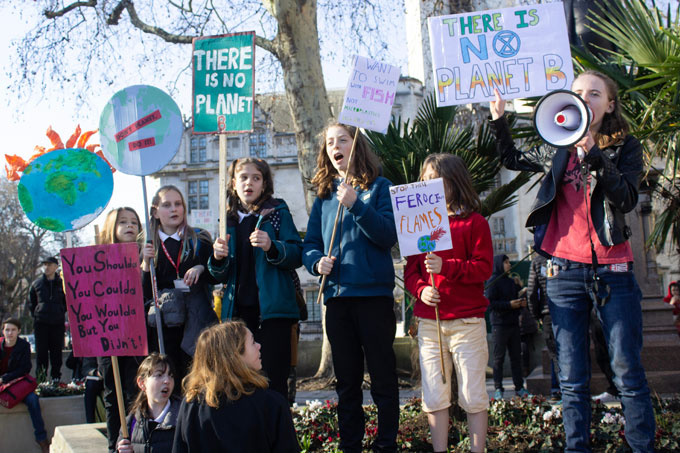Adriana Consorte-McCrea argues for a new planet centred education to help prioritise and understand the connections between the living planet, our local communities, and all of humanity.
The UNESCO is presently inviting people to contribute their thoughts on the Futures of Education. They intend to present the major messages from such contributions to “the International Commission that steers the work of the Futures of Education initiative.”
The challenging times we have experienced during the past year catalysed stimulating and inspiring discussions. These exceptional conditions have made it possible for a plethora of great thinkers from across the globe to get together within the ethereal virtual space. I have personally followed discussions in the areas of education, education for sustainability, ethics, economics, climate justice, racial justice, decolonization, and wildlife conservation. Their thoughts, discomfort, hopes and aspirations about present and future converged in many ways, contributing to the reflections that guided my response to UNESCO’s question: In your opinion, what is the major, key issue for the futures of education?
Educating for the planet
Future education must become planet centred. The pandemic made the importance of learning how this planet functions very clear. It also seems clear that we need to prioritise the understanding of interconnections, rather than disciplinary silos, to restore and nurture a healthy planet for ourselves and the next generations.
Planet centred education would focus on teaching and learning about:
- the workings of the planet as a living system, of which we are part
- how to live sustainably within the planetary boundaries
- ethical values celebrating diversity and upholding responsibility and equal rights to underpin our actions as individuals, community members and in the formation of professionals
- traditional and innovative solutions that will inform the development of sustainable businesses, industries, and societies.
The present system that drives climate change and biodiversity loss promotes unsustainable use of ecosystems, exhausting soil and water quality, bringing distressed animals in contact with humans and livestock and encouraging catastrophic events such as pandemics.
Planet centred education works towards understanding our interdependence and the interrelationships between biodiversity and the ecosystem services that sustain our lives. The underpinning values of a planet centred education would reflect our deep connections with the living planet, with our local communities, and with all of humanity, rather than focus on separation between humans and the living world and between humans and other humans.
Planet centred education requires a shift in values from wealth accumulation, the exploitation of nature and of other human beings to a focus on quality of life, diversity, fairness and justice. Hence, the focus of education would change from endless quantitative growth to growth that is qualitative and regenerative. It requires that we think about the impacts of our decisions and acts on our planet, through cultivating an ethic or care.
To provide education that creates sustainable solutions and prepares individuals to be agents of change and to contribute to a sustainable economy, education must also be inclusive of other ways of knowing and engage with non-Western, indigenous knowledge to enrich existing subject areas and practices.
Planet centred education would produce knowledge to guide informed decisions across areas, from reducing carbon footprint through consumer choice, and sourcing sustainable materials and equipment for the institution, to favouring business models that account for costs and benefits towards planet and society.
Such future education, rather than preparing people to align with a job market that fails the planet, will prepare students for workplaces that are committed to developing solutions. This requires a shift of attention from the accumulation of knowledge to collaboration with initiatives and employers to develop ways to meet the needs of our planet and its communities responsibly.
The use of pedagogies such as experiential learning outside the classroom, creating opportunities for contact with the rest of nature, working with local rural and urban business and industry, will be as important as using modern tools such as the internet and social media to engage society.
Students educated for the planet will combine cognitive powers such as creativity, critical thinking and curiosity with compassion. They will understand their place in the world, their agency and responsibilities as individuals, and feel compelled to co-create the present as part of a community and as part of a living planetary system.
In his book Our wild calling, Richard Louv proposes what schools should be like if they aimed to build connections between people and other animals. He says: “In addition to traditional biology and ecology courses, students could learn about inter-species and intraspecies communication, including bird language, reap a deeper understanding of the schools bio region and come to know (urban wildlife”.
With moral principles guiding the curriculum students would learn empathy through experiences with other species, and how to use knowledge about native plants to build biodiversity in gardens and rooftops; “how different cultures connect with the natural world, the impact of natural history on human history” and “the fundamentals of biophilic architecture and biomimicry”. Building such applied knowledge would make for engaging learning environments that clearly connect with the local living community.
We cannot afford to destroy what gives us life, but it would be more rewarding caring for it out of love rather than out of duty. Ronald Barnett refers to his ‘Ecological University’ as a ‘feasible utopia’. Ideal visions for the future cannot easily be exhausted. This piece works as a brief collection of imagined informed targets some people, including myself, wish education would aspire to meet. They may merely guide our aspirations and give us another reason to persist.
Adriana Consorte-McCrea is a Conservation Biologist, and Education for Sustainability Lead in the University’s Academy for Sustainable Futures.
 Expert comment
Expert comment Jeanette Earl
Jeanette Earl 3336
3336


